DALLAS — Seeing students rush to leave in August 2021 as the U.S. withdrew from Afghanistan after 20 years, colleges, universities and other groups across the U.S. started piecing together the funding for hundreds of scholarships so they could continue their educations outside their home country.
Women born around the time the U.S. ousted the Taliban after the Sept. 11, 2001, attacks grew up attending school and watching as women pursued careers. The Taliban’s return upended those freedoms.
“Within minutes of the collapse of the government in Kabul, U.S. universities said, ‘We’ll take one;’ ‘We’ll take three;’ ‘We’ll take a professor;’ ‘We’ll take a student,'” said Allan Goodman, CEO of the Institute of International Education, a global not-for-profit that helps fund such scholarships.
The fears leading the students to quickly board flights were soon justified as the Taliban ushered in a harsh Islamic rule: Girls cannot attend school beyond the sixth grade and women, once again required to wear burqas, have been banned from universities and are restricted from most employment.
Fahima Sultani, 21, is one of more than 60 Afghan women who arrived at Arizona State University in Tempe by December 2021 after fleeing Afghanistan, where she had been studying online through Asian University for Women in Bangladesh during the pandemic.
“These women came out of a crisis, a traumatic experience, boarded a plane not knowing where they were going, ended up in the U.S.,” said Susan Edgington, executive director and head of operations of Arizona State’s Global Academic Initiatives.
After making their way to universities and colleges across the U.S. over the past two years, many are nearing graduation and planning their futures.
Mashal Aziz, 22, was a few months from graduating from American University of Afghanistan when Kabul fell and she boarded a plane. After leaving, she scoured the internet, researching which schools were offering scholarships and what organizations might be able to help.
“You’ve already left everything and you are thinking maybe there are barriers for your higher education,” she said.
Aziz and three other Afghan students arrived at Northeastern University in Boston in January 2022 after first being taken to Qatar and then a military base in New Jersey. She graduated this spring with a bachelor’s degree in finance and accounting management and plans to start work on her master’s degree in finance this fall at Northeastern.
Just two days after the fall of Kabul, the University of Tulsa announced it had created two scholarships for Afghans seeking refuge in the U.S. Later, the university created five more scholarships that went to some of the young Afghans who had settled in the area. Five more Afghans have received scholarships to study there this fall.
Danielle Macdonald, an associate anthropology professor at the school, has organized a regular meetup between University of Tulsa students and college-age Afghans who have settled in the Tulsa area.
About two dozen young people attend the events, where they have talked about everything from U.S. slang to how to find a job. Their outings have included visiting a museum and going to a basketball game, Macdonald said.
“It’s become a really lovely community,” she said.
Sultani, like many others who left Afghanistan, often thinks about those who remained behind, including her sister, who had been studying at a university, but now must stay home.
“I can go to universities while millions of girls back in Afghanistan, they do not have this opportunity that I have,” Sultani said. “I can dress the way I want and millions of girls now in Afghanistan, they do not have this opportunity.”
Since the initial flurry of scholarships, efforts to assist Afghan students have continued, including the creation of the Qatar Scholarship for Afghans Project, which has helped fund 250 scholarships at dozens of U.S. colleges and universities.
But there are still more young people in need of support to continue their educations in the U.S. or even reach the U.S. from Afghanistan or other countries, explained Jonah Kokodyniak, a senior vice president at the Institute of International Education.
Yasamin Sohrabi, 26, is among those still trying to find a way to the U.S. Sohrabi, who had been studying at American University of Afghanistan, realized as the withdrawal of U.S. forces neared that she might need to go overseas to continue her studies. The day after the Taliban took Kabul, she learned of her admission to Western Kentucky University in Bowling Green, but wasn’t able to get into the airport to leave Afghanistan.
A year later, she and her younger sister, who has also been accepted at the university, got visas to Pakistan. Now they are trying to find a way to get into the U.S. Their brother, who accompanied them to Pakistan, is applying to the school as well.
Sohrabi said she and her siblings try not to focus on what they have lost, but instead on how to get to Western Kentucky University, where 20 other Afghans will be studying this fall.
“That’s one of the things in these days we think about,” she said. “It keeps us going.”
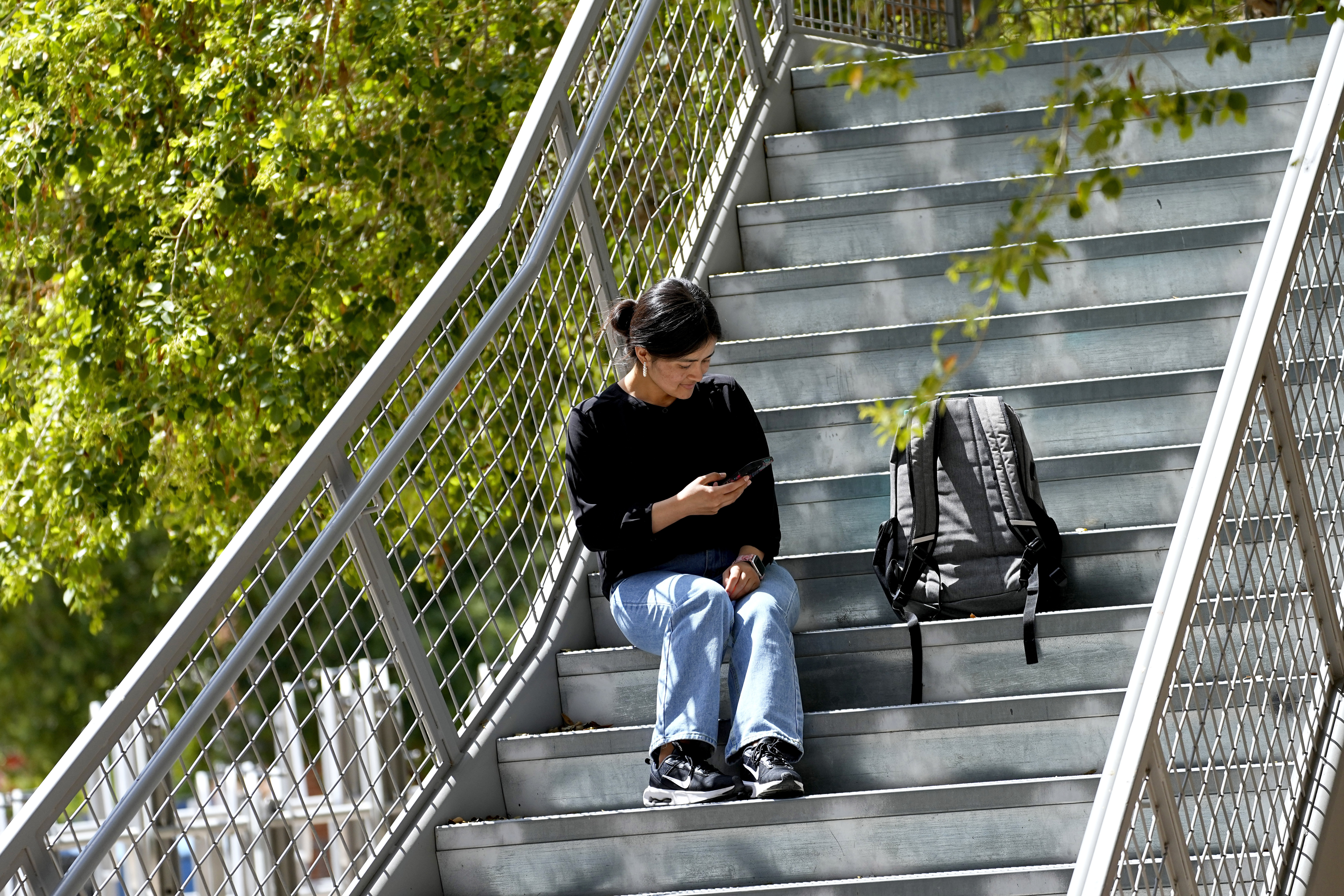 Fahima Sultani checks her phone on campus at Arizona State University, Friday, April 7, 2023, in Tempe, Ariz. Sultani and others tried for days in the summer of 2021 to get into the Kabul airport, only to be turned away by the gun-wielding extremists as the Taliban swept back into power. After a harrowing escape, Sultani is one of more than 60 Afghan women who arrived at ASU in December 2021. (AP Photo/Matt York)
Fahima Sultani checks her phone on campus at Arizona State University, Friday, April 7, 2023, in Tempe, Ariz. Sultani and others tried for days in the summer of 2021 to get into the Kabul airport, only to be turned away by the gun-wielding extremists as the Taliban swept back into power. After a harrowing escape, Sultani is one of more than 60 Afghan women who arrived at ASU in December 2021. (AP Photo/Matt York)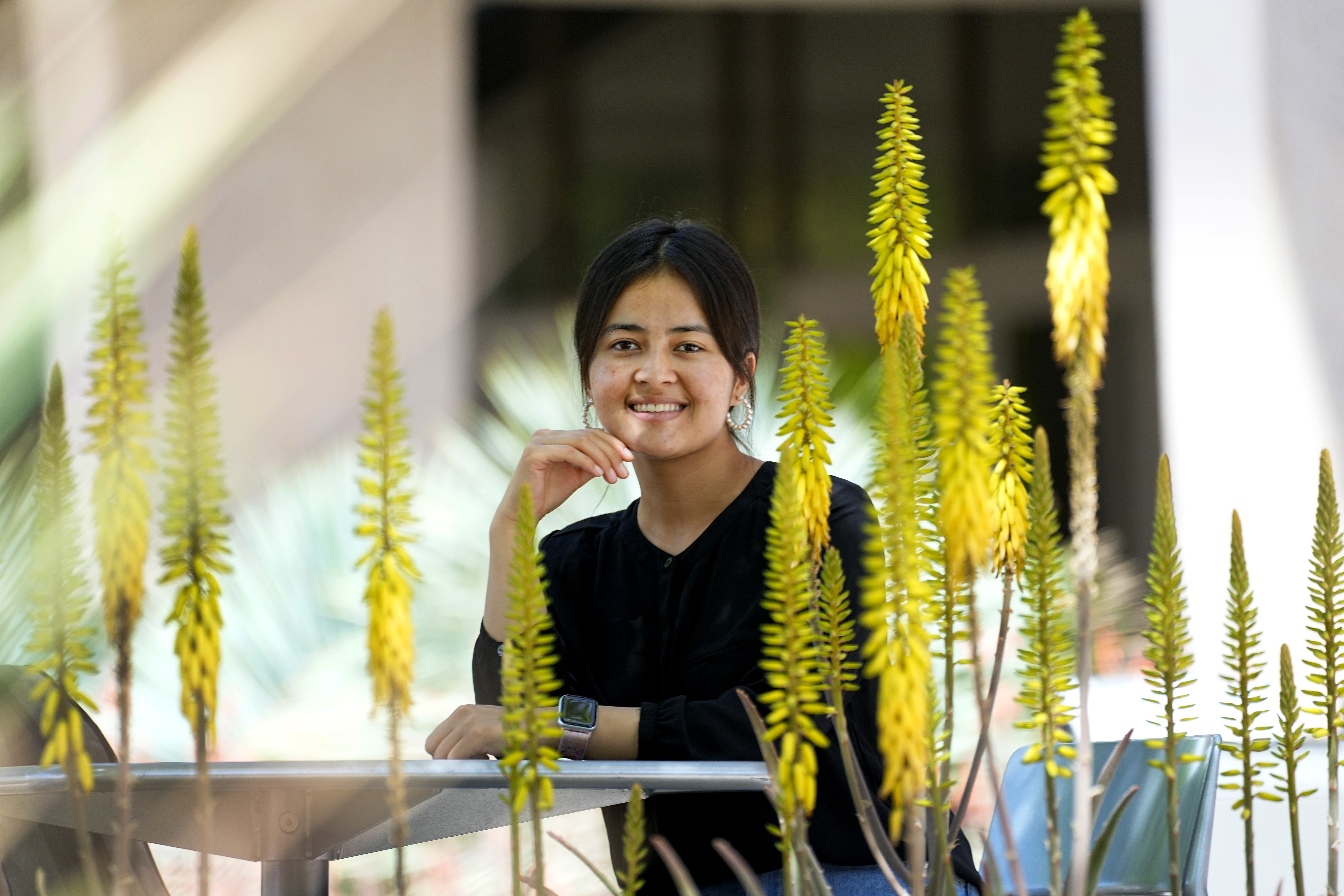 Fahima Sultani sits between classes at Arizona State University, Friday, April 7, 2023, in Tempe, Ariz. Sultani and others tried for days in the summer of 2021 to get into the Kabul airport, only to be turned away by the gun-wielding extremists as the Taliban swept back into power. After a harrowing escape, Sultani is one of more than 60 Afghan women who arrived at ASU in December 2021. (AP Photo/Matt York)
Fahima Sultani sits between classes at Arizona State University, Friday, April 7, 2023, in Tempe, Ariz. Sultani and others tried for days in the summer of 2021 to get into the Kabul airport, only to be turned away by the gun-wielding extremists as the Taliban swept back into power. After a harrowing escape, Sultani is one of more than 60 Afghan women who arrived at ASU in December 2021. (AP Photo/Matt York)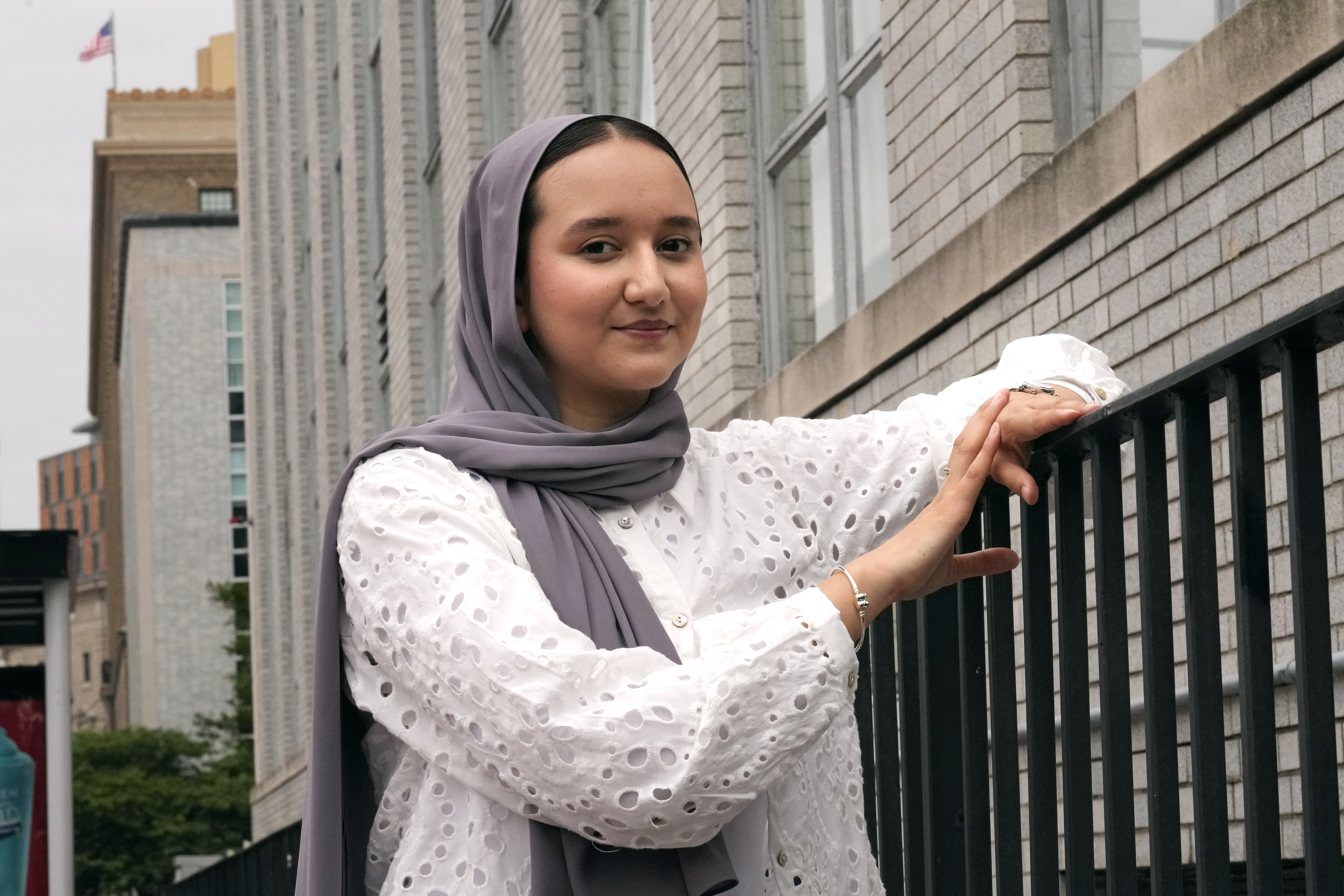 Northeastern University student Mashal Aziz poses on campus, Friday, July 21, 2023, in Boston. Aziz was just months away from graduating from college in Afghanistan when she found herself rushing to the airport to leave the country as the Taliban swept into power. Universities and colleges across the U.S. have scrambled to find ways to help students, like Aziz, to continue their education. (AP Photo/Charles Krupa)
Northeastern University student Mashal Aziz poses on campus, Friday, July 21, 2023, in Boston. Aziz was just months away from graduating from college in Afghanistan when she found herself rushing to the airport to leave the country as the Taliban swept into power. Universities and colleges across the U.S. have scrambled to find ways to help students, like Aziz, to continue their education. (AP Photo/Charles Krupa)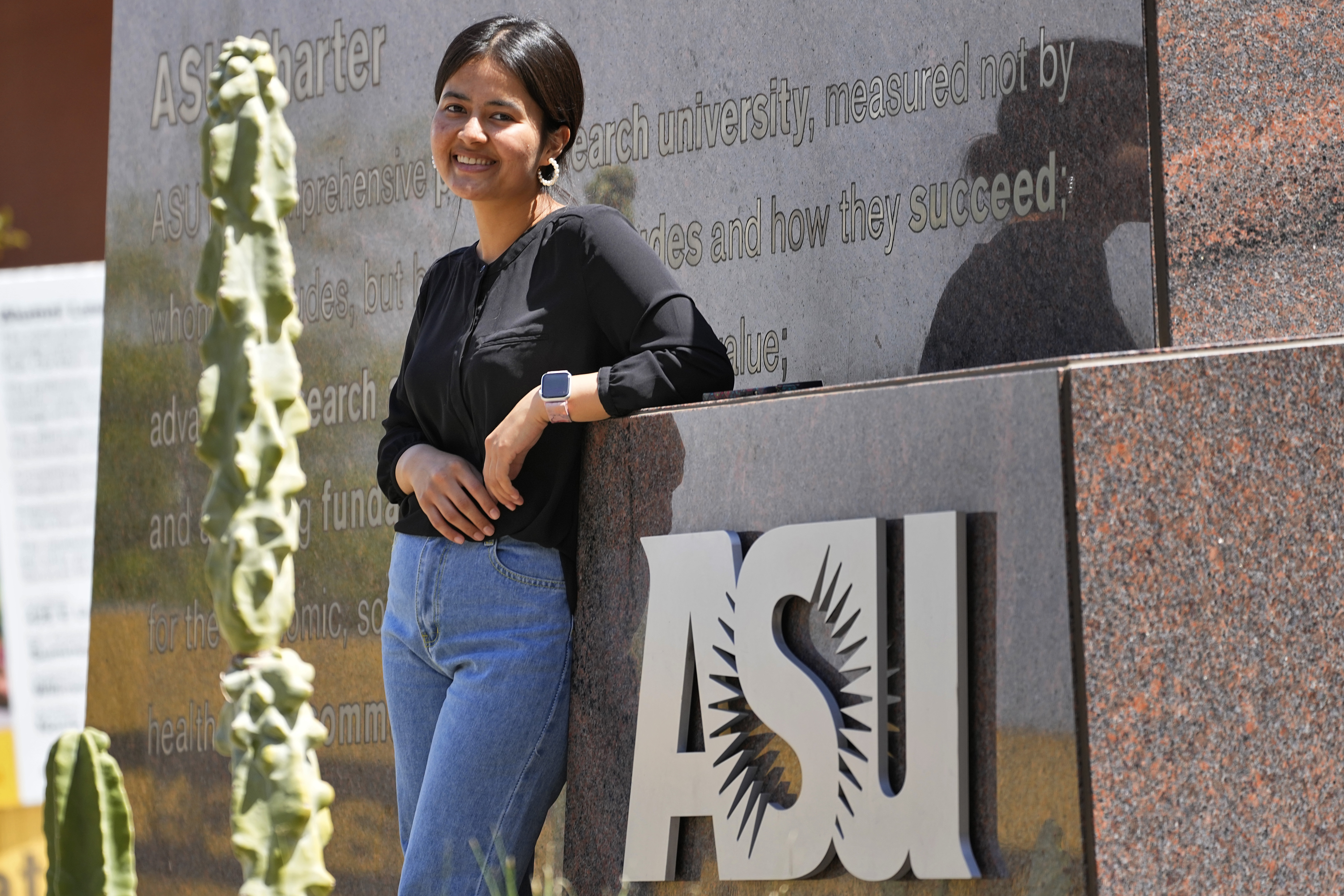 Fahima Sultani stands at the entrance of Arizona State University, Friday, April 7, 2023, in Tempe, Ariz. Sultani and others tried for days in the summer of 2021 to get into the Kabul airport, only to be turned away by the gun-wielding extremists as the Taliban swept back into power. After a harrowing escape, Sultani is one of more than 60 Afghan women who arrived at ASU in December 2021. (AP Photo/Matt York)
Fahima Sultani stands at the entrance of Arizona State University, Friday, April 7, 2023, in Tempe, Ariz. Sultani and others tried for days in the summer of 2021 to get into the Kabul airport, only to be turned away by the gun-wielding extremists as the Taliban swept back into power. After a harrowing escape, Sultani is one of more than 60 Afghan women who arrived at ASU in December 2021. (AP Photo/Matt York)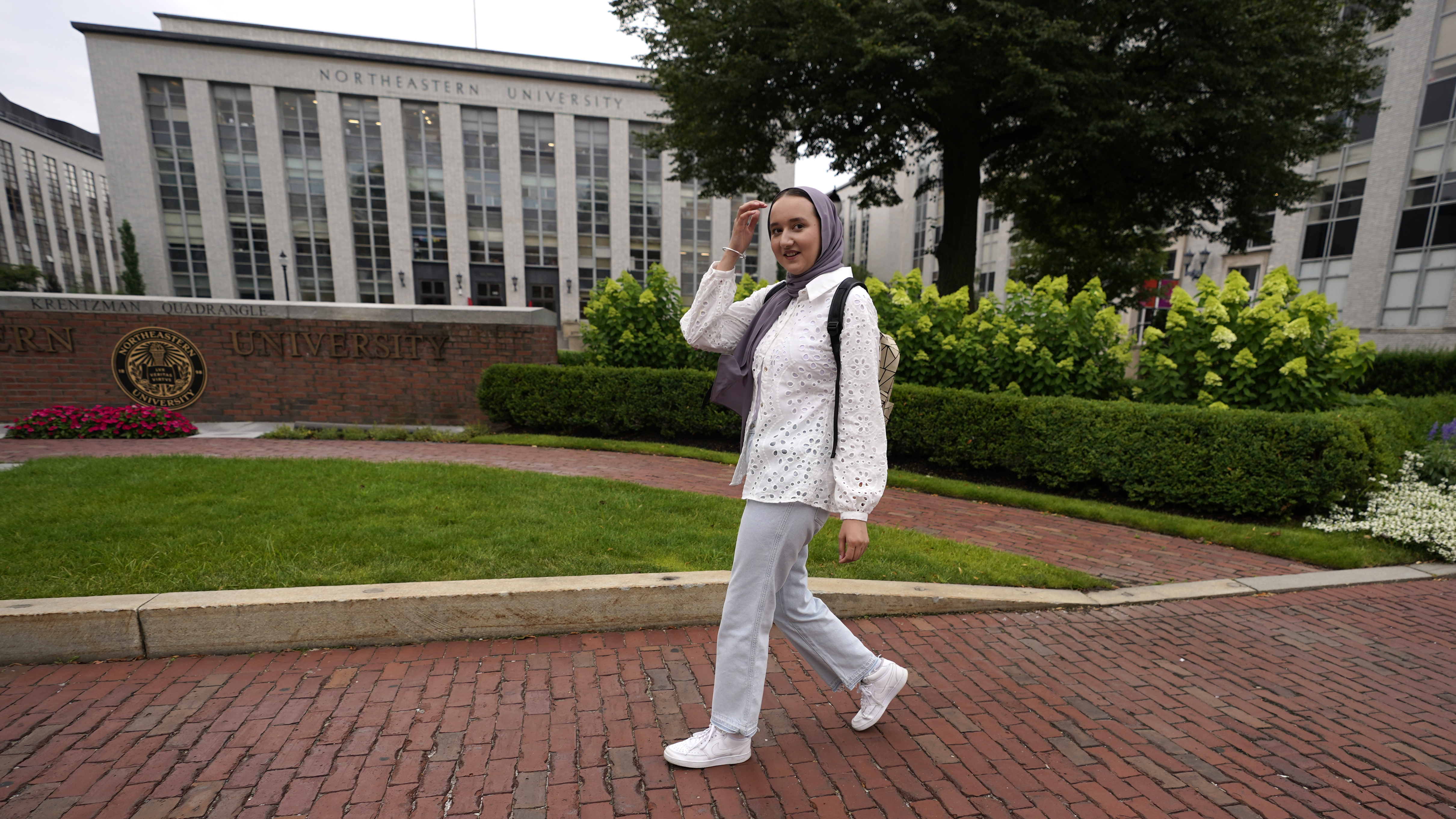 Northeastern University student Mashal Aziz poses on campus, Friday, July 21, 2023, in Boston. Aziz was just months away from graduating from college in Afghanistan when she found herself rushing to the airport to leave the country as the Taliban swept into power. Universities and colleges across the U.S. have scrambled to find ways to help students, like Aziz, to continue their education. (AP Photo/Charles Krupa)
Northeastern University student Mashal Aziz poses on campus, Friday, July 21, 2023, in Boston. Aziz was just months away from graduating from college in Afghanistan when she found herself rushing to the airport to leave the country as the Taliban swept into power. Universities and colleges across the U.S. have scrambled to find ways to help students, like Aziz, to continue their education. (AP Photo/Charles Krupa)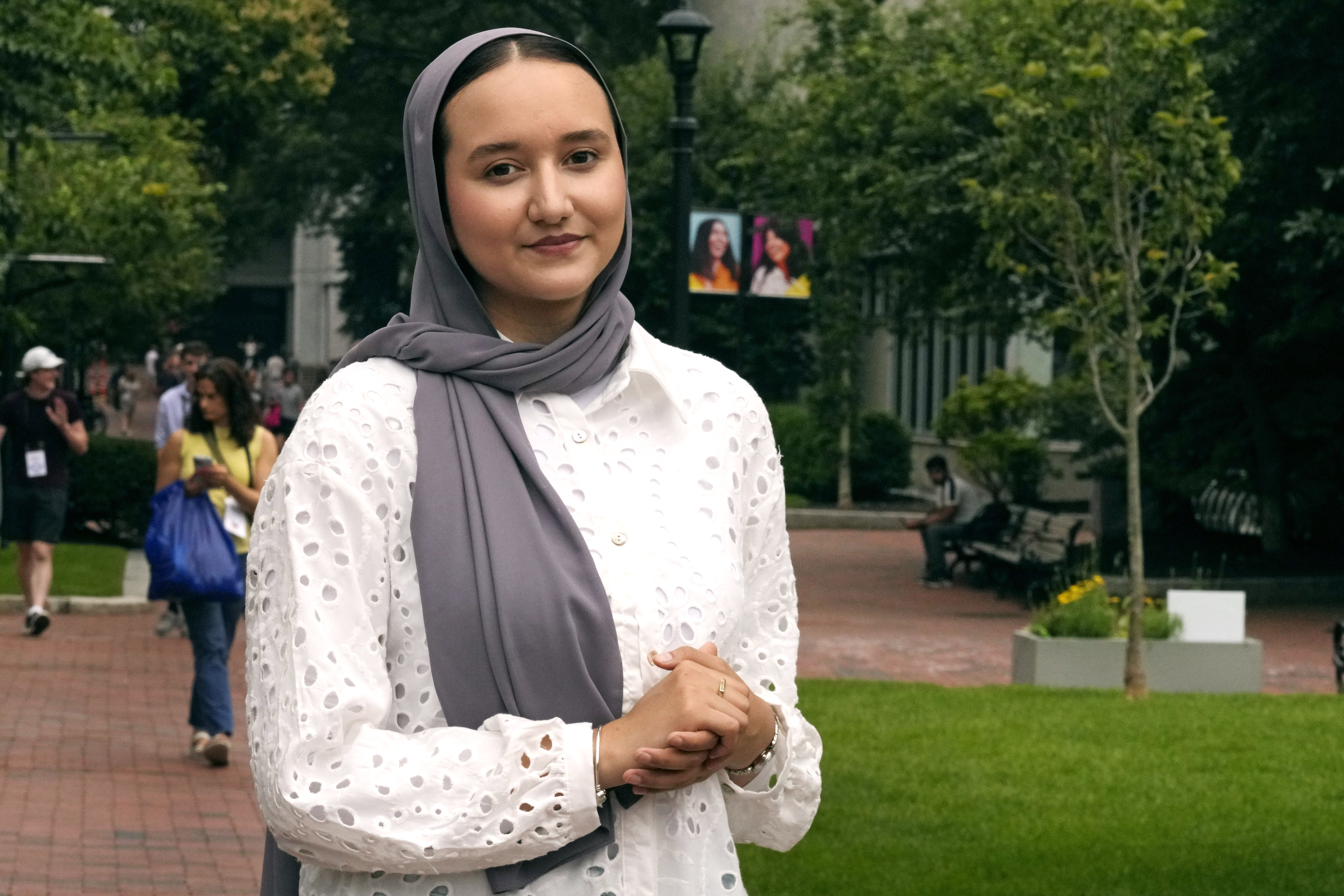 Northeastern University student Mashal Aziz poses on campus, Friday, July 21, 2023, in Boston. Aziz was just months away from graduating from college in Afghanistan when she found herself rushing to the airport to leave the country as the Taliban swept into power. Universities and colleges across the U.S. have scrambled to find ways to help students, like Aziz, to continue their education. (AP Photo/Charles Krupa)
Northeastern University student Mashal Aziz poses on campus, Friday, July 21, 2023, in Boston. Aziz was just months away from graduating from college in Afghanistan when she found herself rushing to the airport to leave the country as the Taliban swept into power. Universities and colleges across the U.S. have scrambled to find ways to help students, like Aziz, to continue their education. (AP Photo/Charles Krupa)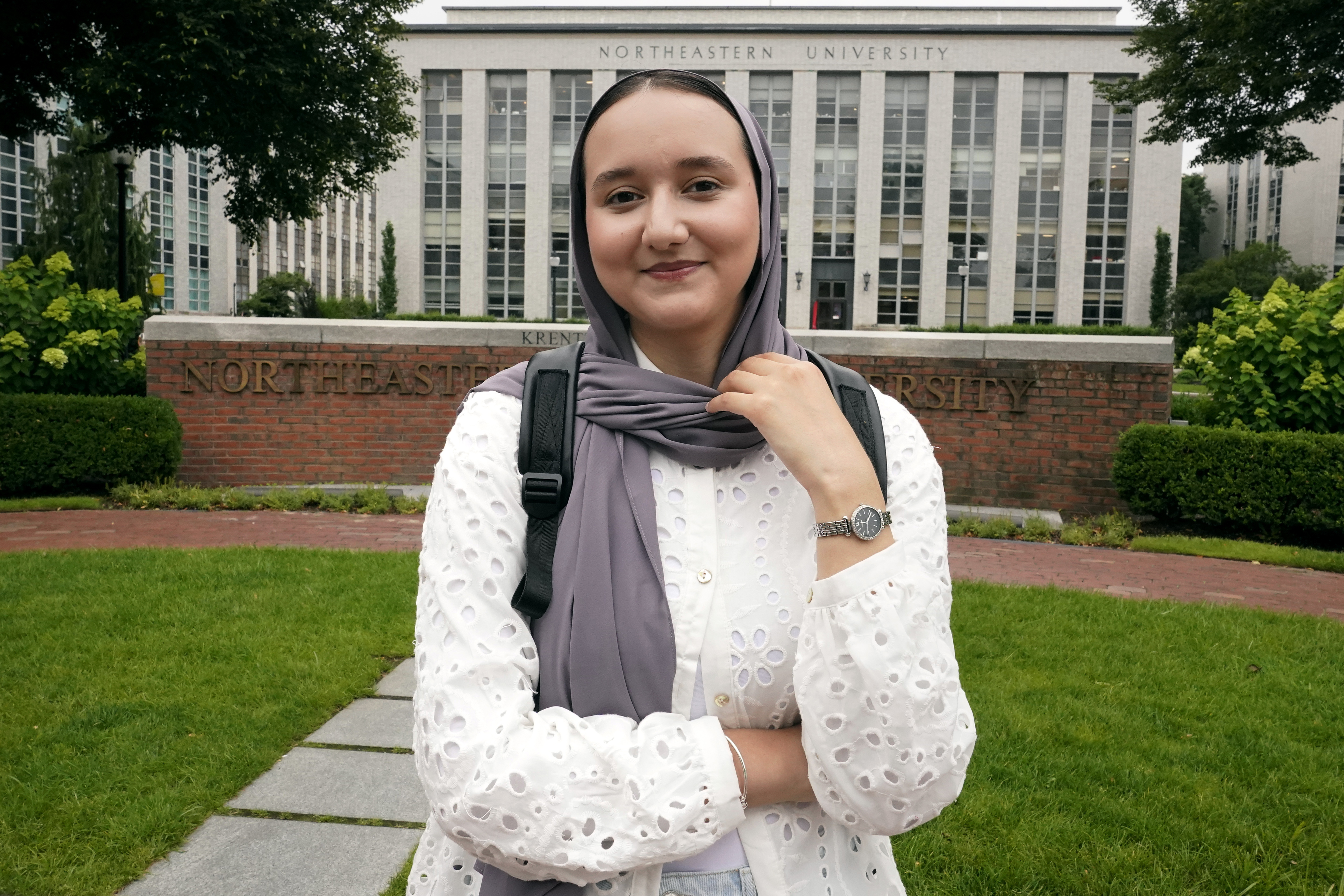 Northeastern University student Mashal Aziz poses on campus, Friday, July 21, 2023, in Boston. Aziz was just months away from graduating from college in Afghanistan when she found herself rushing to the airport to leave the country as the Taliban swept into power. Universities and colleges across the U.S. have scrambled to find ways to help students, like Aziz, to continue their education. (AP Photo/Charles Krupa)
Northeastern University student Mashal Aziz poses on campus, Friday, July 21, 2023, in Boston. Aziz was just months away from graduating from college in Afghanistan when she found herself rushing to the airport to leave the country as the Taliban swept into power. Universities and colleges across the U.S. have scrambled to find ways to help students, like Aziz, to continue their education. (AP Photo/Charles Krupa)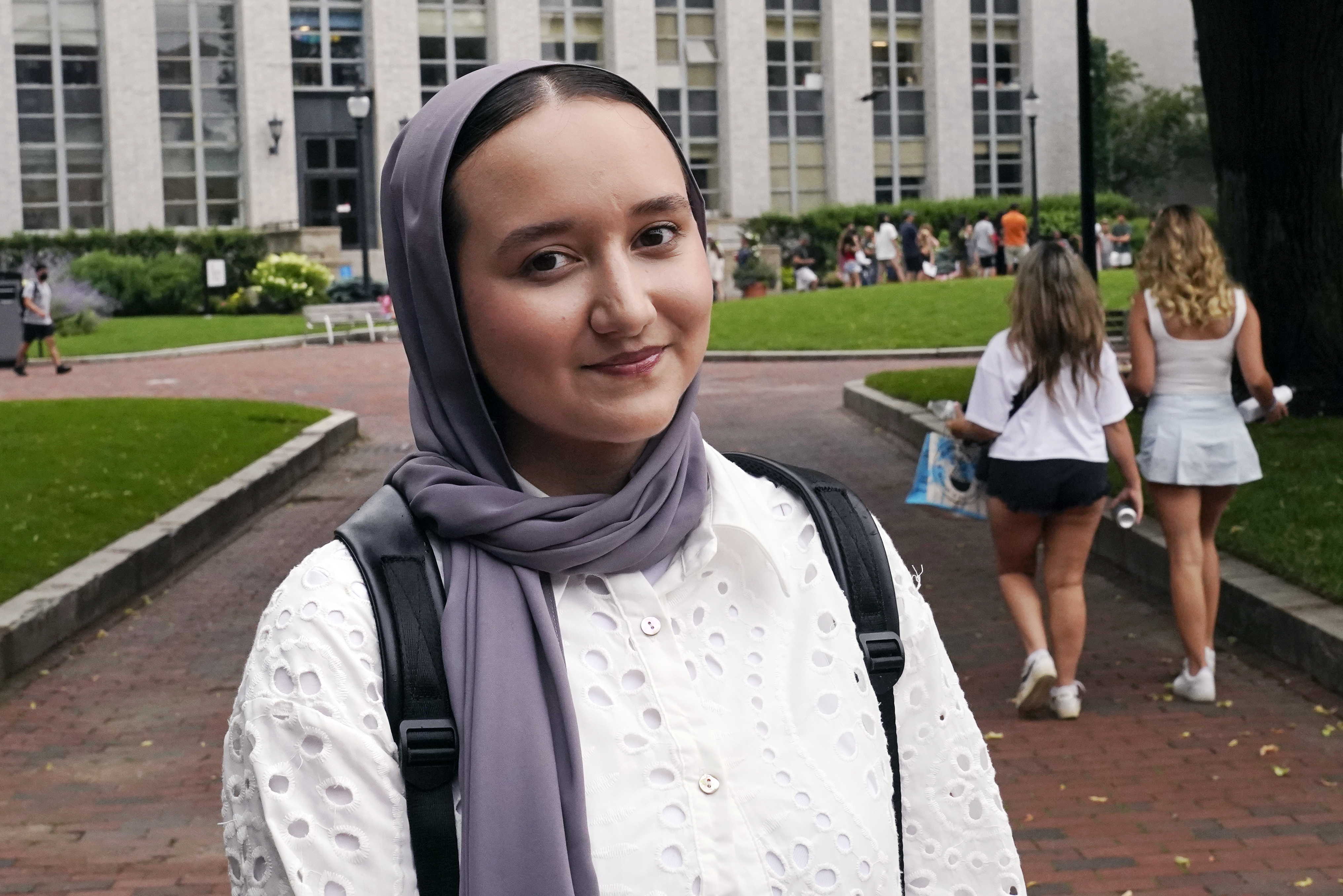 Northeastern University student Mashal Aziz poses on campus, Friday, July 21, 2023, in Boston. Aziz was just months away from graduating from college in Afghanistan when she found herself rushing to the airport to leave the country as the Taliban swept into power. Universities and colleges across the U.S. have scrambled to find ways to help students, like Aziz, to continue their education. (AP Photo/Charles Krupa)
Northeastern University student Mashal Aziz poses on campus, Friday, July 21, 2023, in Boston. Aziz was just months away from graduating from college in Afghanistan when she found herself rushing to the airport to leave the country as the Taliban swept into power. Universities and colleges across the U.S. have scrambled to find ways to help students, like Aziz, to continue their education. (AP Photo/Charles Krupa)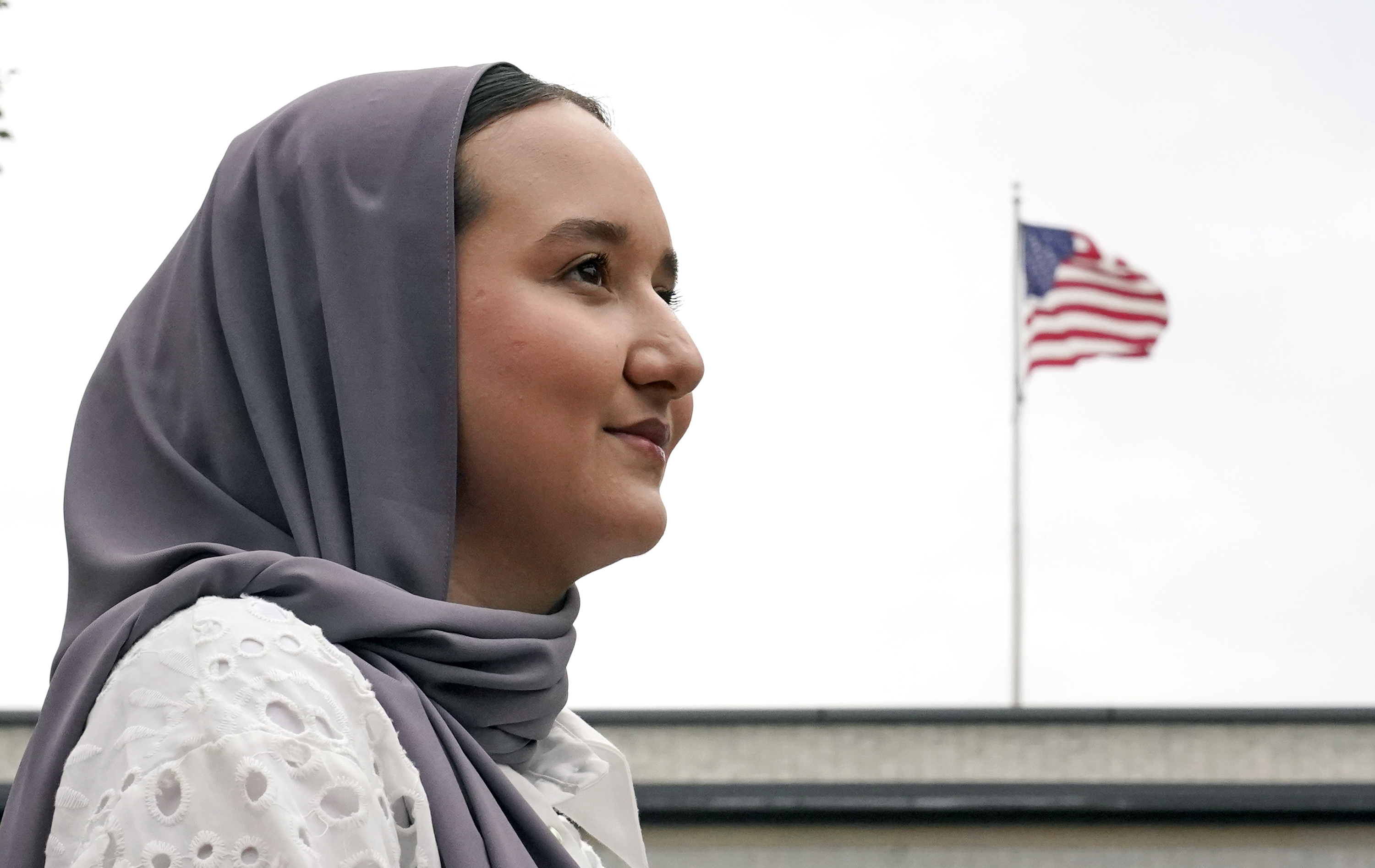 Northeastern University student Mashal Aziz poses on campus, Friday, July 21, 2023, in Boston. Aziz was just months away from graduating from college in Afghanistan when she found herself rushing to the airport to leave the country as the Taliban swept into power. Universities and colleges across the U.S. have scrambled to find ways to help students, like Aziz, to continue their education. (AP Photo/Charles Krupa)
Northeastern University student Mashal Aziz poses on campus, Friday, July 21, 2023, in Boston. Aziz was just months away from graduating from college in Afghanistan when she found herself rushing to the airport to leave the country as the Taliban swept into power. Universities and colleges across the U.S. have scrambled to find ways to help students, like Aziz, to continue their education. (AP Photo/Charles Krupa)


